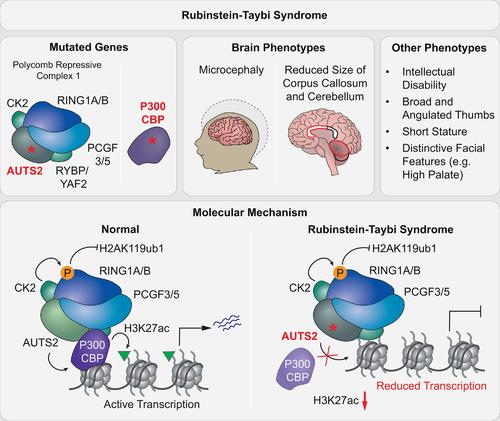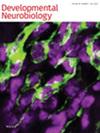Polycomb-mediated gene regulation in human brain development and neurodevelopmental disorders
IF 2.7
4区 医学
Q2 DEVELOPMENTAL BIOLOGY
引用次数: 9
Abstract
The neocortex is considered the seat of higher cognitive function in humans. It develops from a sheet of neural progenitor cells, most of which eventually give rise to neurons. This process of cell fate determination is controlled by precise temporal and spatial gene expression patterns that in turn are affected by epigenetic mechanisms including Polycomb group (PcG) regulation. PcG proteins assemble in multiprotein complexes and catalyze repressive posttranslational histone modifications. Their association with neurodevelopmental disease and various types of cancer of the central nervous system, as well as observations in mouse models, has implicated these epigenetic modifiers in controlling various stages of cortex development. The precise mechanisms conveying PcG‐associated transcriptional repression remain incompletely understood and are an active field of research. PcG activity appears to be highly context‐specific, raising the question of species‐specific differences in the regulation of neural stem and progenitor regulation. In this review, we will discuss our growing understanding of how PcG regulation affects human cortex development, based on studies in murine model systems, but focusing mostly on findings obtained from examining impaired PcG activity in the context of human neurodevelopmental disorders and cancer. Furthermore, we will highlight relevant experimental approaches for functional investigations of PcG regulation in human cortex development.

polycomb介导的基因调控在人脑发育和神经发育障碍中的作用
新皮层被认为是人类高级认知功能的所在地。它由一层神经祖细胞发育而来,其中大部分最终形成神经元。这个决定细胞命运的过程是由精确的时间和空间基因表达模式控制的,而基因表达模式又受包括Polycomb group (PcG)调控在内的表观遗传机制的影响。PcG蛋白组装成多蛋白复合物,并催化抑制性翻译后组蛋白修饰。它们与神经发育疾病和各种中枢神经系统癌症的关联,以及在小鼠模型中的观察,暗示了这些表观遗传修饰因子在控制皮层发育的各个阶段。传递pcg相关转录抑制的确切机制仍然不完全清楚,并且是一个活跃的研究领域。PcG活性似乎具有高度的环境特异性,这就提出了神经系统和祖细胞调节的物种特异性差异的问题。在这篇综述中,我们将基于小鼠模型系统的研究,讨论我们对PcG调节如何影响人类皮层发育的日益加深的理解,但主要关注在人类神经发育障碍和癌症背景下检查PcG活性受损所获得的发现。此外,我们将重点介绍PcG在人类皮层发育中的功能研究的相关实验方法。
本文章由计算机程序翻译,如有差异,请以英文原文为准。
求助全文
约1分钟内获得全文
求助全文
来源期刊

Developmental Neurobiology
生物-发育生物学
CiteScore
6.50
自引率
0.00%
发文量
45
审稿时长
4-8 weeks
期刊介绍:
Developmental Neurobiology (previously the Journal of Neurobiology ) publishes original research articles on development, regeneration, repair and plasticity of the nervous system and on the ontogeny of behavior. High quality contributions in these areas are solicited, with an emphasis on experimental as opposed to purely descriptive work. The Journal also will consider manuscripts reporting novel approaches and techniques for the study of the development of the nervous system as well as occasional special issues on topics of significant current interest. We welcome suggestions on possible topics from our readers.
 求助内容:
求助内容: 应助结果提醒方式:
应助结果提醒方式:


